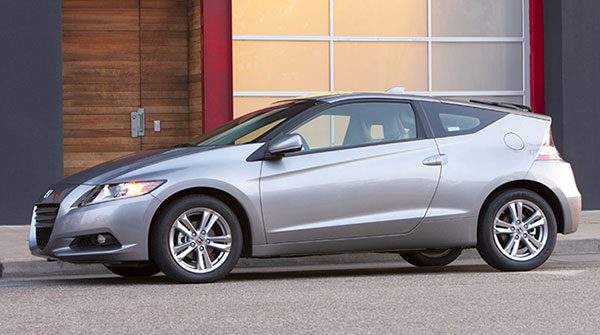
2011 Honda CR-Z was a different animal. Although clearly a gas-sipper and aimed at drivers who value fuel economy over just about everything else, it was also aimed at enthusiasts and tree-huggers alike.
A nod to the beloved CRX with a twist of eco-friendly performance

Introduced in late 2010, the Honda CR-Z hybrid bore more than a passing resemblance to one of the company’s most beloved models: the CRX.
This was no coincidence. The pint-sized, Civic-derived CRX hatchback was a favourite with tuners and enthusiasts, and many lament its passing in the early 1990s.
But the CR-Z was a different animal. Although clearly a gas-sipper and aimed at drivers who value fuel economy over just about everything else, it was also aimed at enthusiasts and tree-huggers alike.
According to Honda, drivers aged 35 or under and sports car buffs were the primary targets, with hybrid customers coming second.
| Related Stories |
| 2018 Toyota Camry Hybrid delivers impressive performance
|
| Three good bets if you’re shopping for a used hybrid
|
| The Toyota Corolla is a hybrid for the masses
|
Power was supplied by a 1.5-litre four-cylinder gas engine supplemented by Honda’s Integrated Motor Assist (IMA) electric motor to produce 122 horsepower and 128 foot-pounds of torque.
IMA was, and is, used elsewhere in Honda’s lineup, including the Insight hybrid. And the internal combustion engine was very similar to that found in the Fit subcompact. Together, they worked seamlessly and gave the CR-Z a lively but not exceptional performance. Torque was a little hard to find at low RPMs, and if you really wanted to get the CR-Z moving, you had to step on the pedal.
This gas engine also featured Honda’s i-VTEC variable valve technology, which shuts down one valve per cylinder during low RPMs. Along with an air conditioning reduction feature and the electric motor, this helped the CR-Z achieve its fuel economy – and emission – levels.
You could get a continuous variable transmission (CVT) automatic or a six-speed manual. The latter gearbox was the first of its kind to be fitted to a hybrid vehicle, and it featured hill-start assist.
Besides being $800 cheaper than its automatic stablemate, the manual gearbox version delivered 6.5 litres per 100 km in town and a thrifty 5.3 litres per kilometre on the highway. Although among the best fuel consumption numbers in the industry, they weren’t quite as good as the Honda Insight or Toyota Prius.
Like most of Honda’s hybrid models, you could choose from three driving modes: Sport, Normal or Economy. The performance difference between Economy and Sport was dramatic. Still, when it comes to combined fuel economy, the CR-Z was one of the least thrifty compact hybrids on the market, behind the Prius, Insight and Ford Fusion.
Standard equipment included a climate control system, hands-free Bluetooth capability, power windows and door locks, keyless entry and a 360-watt stereo system. Although there might be room for an illicit passenger or two in the back, this was officially a two-seater, just like the CRX.
There was one safety recall to report from Transport Canada and the U.S. National Highway Traffic Safety Administration (NHTSA), and it’s a beauty. Apparently, under heavy load – winter driving, for example – the Engine Control Unit (ECU) in manual transmission models can cause the electric motor to “rotate” the internal combustion engine in the opposite direction, causing “the vehicle to move in the reverse direction of that expected.”
Whoops.
Honda dealers installed new software to prevent this.
Nine customer complaints were registered with NHTSA. They include alleged brake failure resulting in a rear-ender, problems with the rear hatchback not functioning in extremely cold weather, inadequate headlights, and unusual “clunking” and “sputtering” noises, followed by an engine stall.
Aside from some minor issues with squeaks and rattles, it was all sweetness and light at Consumer Reports. The CR-Z got top marks in virtually every category, garnering a “much better than average” new car prediction.
Said CR: “We expect reliability of new models will be 57 per cent above average.”
Some comments to CR from owners:
- “I’m just finishing a three-year lease, and I’ve averaged 43 mph (6.6 L/100 km) in Economy mode.”
- “I could write a book about how much I enjoy the driving experience.”
- “Road noise could be better.”
Marketing researcher J.D. Power gave the CR-Z a “better than most” grade for predicted reliability, overall quality, and overall performance and design. It notes that the Insurance Institute for Highway Safety (IIHS) gives it the highest possible Good ratings in all its crash tests.
2011 Honda CR-Z
Original base price: $23,490
Engine: 1.5-litre four-cylinder with 10-kilowatt DC electric motor
Horsepower/torque: 122/128
Transmission: six-speed manual and CVT automatic
Fuel economy (litres/100 km): 6.5 city, 5.3 highway, with regular gas
Some alternatives: Honda Insight, Toyota Prius, Toyota Yaris, Chevrolet Aveo, Kia Rio, Hyundai Accent, Mini Cooper, Toyota Scion IQ, Mitsubishi Eclipse, Nissan Versa, Ford Fiesta, Mazda2
Ted Laturnus has been an automotive journalist since 1976.
For interview requests, click here.
The opinions expressed by our columnists and contributors are theirs alone and do not inherently or expressly reflect the views of our publication.
© Troy Media
Troy Media is an editorial content provider to media outlets and its own hosted community news outlets across Canada.

